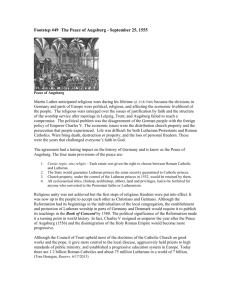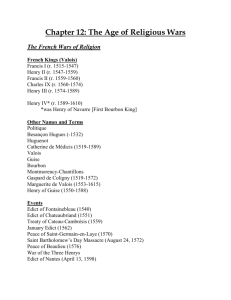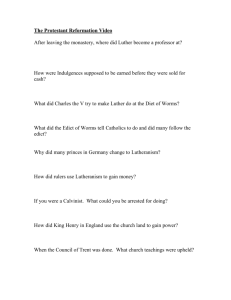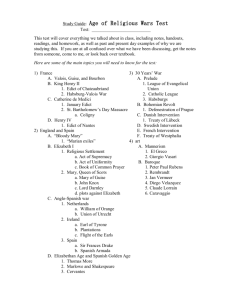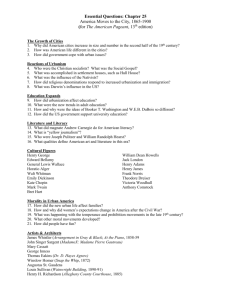The Peace o f Augsburg (1555) The Peace of Augsburg, a treaty
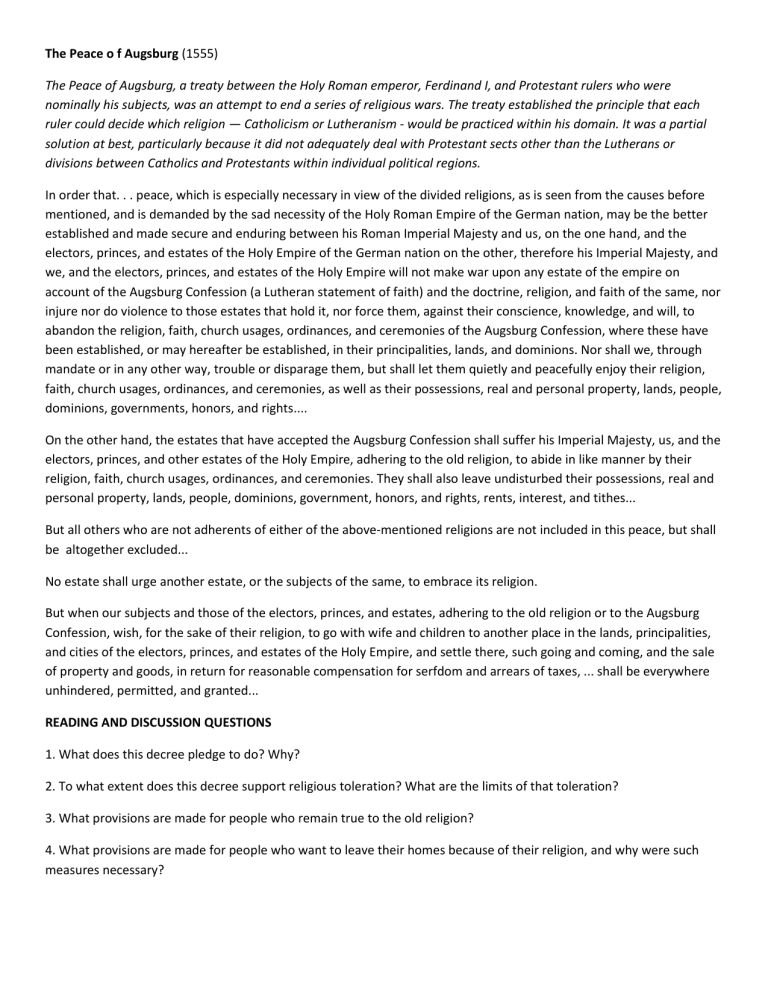
The Peace o f Augsburg (1555)
The Peace of Augsburg, a treaty between the Holy Roman emperor, Ferdinand I, and Protestant rulers who were nominally his subjects, was an attempt to end a series of religious wars. The treaty established the principle that each ruler could decide which religion — Catholicism or Lutheranism - would be practiced within his domain. It was a partial solution at best, particularly because it did not adequately deal with Protestant sects other than the Lutherans or
divisions between Catholics and Protestants within individual political regions.
In order that. . . peace, which is especially necessary in view of the divided religions, as is seen from the causes before mentioned, and is demanded by the sad necessity of the Holy Roman Empire of the German nation, may be the better established and made secure and enduring between his Roman Imperial Majesty and us, on the one hand, and the electors, princes, and estates of the Holy Empire of the German nation on the other, therefore his Imperial Majesty, and we, and the electors, princes, and estates of the Holy Empire will not make war upon any estate of the empire on account of the Augsburg Confession (a Lutheran statement of faith) and the doctrine, religion, and faith of the same, nor injure nor do violence to those estates that hold it, nor force them, against their conscience, knowledge, and will, to abandon the religion, faith, church usages, ordinances, and ceremonies of the Augsburg Confession, where these have been established, or may hereafter be established, in their principalities, lands, and dominions. Nor shall we, through mandate or in any other way, trouble or disparage them, but shall let them quietly and peacefully enjoy their religion, faith, church usages, ordinances, and ceremonies, as well as their possessions, real and personal property, lands, people, dominions, governments, honors, and rights....
On the other hand, the estates that have accepted the Augsburg Confession shall suffer his Imperial Majesty, us, and the electors, princes, and other estates of the Holy Empire, adhering to the old religion, to abide in like manner by their religion, faith, church usages, ordinances, and ceremonies. They shall also leave undisturbed their possessions, real and personal property, lands, people, dominions, government, honors, and rights, rents, interest, and tithes...
But all others who are not adherents of either of the above-mentioned religions are not included in this peace, but shall be altogether excluded...
No estate shall urge another estate, or the subjects of the same, to embrace its religion.
But when our subjects and those of the electors, princes, and estates, adhering to the old religion or to the Augsburg
Confession, wish, for the sake of their religion, to go with wife and children to another place in the lands, principalities, and cities of the electors, princes, and estates of the Holy Empire, and settle there, such going and coming, and the sale of property and goods, in return for reasonable compensation for serfdom and arrears of taxes, ... shall be everywhere unhindered, permitted, and granted...
READING AND DISCUSSION QUESTIONS
1. What does this decree pledge to do? Why?
2. To what extent does this decree support religious toleration? What are the limits of that toleration?
3. What provisions are made for people who remain true to the old religion?
4. What provisions are made for people who want to leave their homes because of their religion, and why were such measures necessary?
HENRY IV, from Edict of Nantes (1598)
Prince Henry of Navarre (1553-1610) was a Huguenot, or Protestant, in an overwhelmingly Roman Catholic country. He ascended to the French throne as Henry IV in 1589 in the midst of the French wars of religion. A pragmatist, Henry realized that the country's Catholic majority would never accept a Protestant as their legitimate ruler, so he converted to
Catholicism. However, in order to protect the Huguenots against religiously motivated attacks, as well as to establish peace among the people he was determined to rule, he issued the Edict of Nantes. In so doing, Henry legally sanctioned a degree of religious tolerance in a Europe previously characterized by the formula "one king, one people, one faith."
Among the infinite benefits which it has pleased God to heap upon us, the most signal and precious is his granting us the strength and ability to withstand the fearful disorders and troubles which prevailed on our advent in this kingdom. The realm was so torn by innumerable factions and sects that the most legitimate of all the parties was fewest in numbers.
God has given us strength to stand out against this storm; we have finally surmounted the waves and made our port of safety, — peace for our state. For which his be the glory all in all, and ours a free recognition of his grace in making use of our instrumentality in the good work.... We implore and await from the Divine Goodness the same protection and favor which he has ever granted to this kingdom from the beginning...
We have, by this perpetual and irrevocable edict, established and proclaimed and do establish and proclaim:
I. First, that the recollection of everything done by one party or the other between March, 1585, and our accession to the crown, and during all the preceding period of troubles, remain obliterated and forgotten, as if no such things had ever happened...
III. We ordain that the Catholic Apostolic and Roman religion shall be restored and reestablished in all places and localities of this our kingdom and countries subject to our sway, where the exercise of the same has been interrupted, in order that it may be peaceably and freely exercised, without any trouble or hindrance; forbidding very expressly all persons, of whatsoever estate, quality, or condition, from troubling, molesting, or disturbing ecclesiastics in the celebration of divine service, in the enjoyment or collection of tithes, fruits, or revenues of their benefices, and all other rights and dues belonging to them; and that all those who during the troubles have taken possession of churches, houses, goods or revenues, belonging to the said ecclesiastics, shall surrender to theirs entire possession and peaceable enjoyment of such rights, liberties, and sureties as they had before they were deprived of them...
VI. And in order to leave no occasion for troubles or differences between our subjects, we have permitted, and herewith permit, those of the said religion called Reformed [Protestant] to live and abide in all the cities and places of this our kingdom and countries of our sway, without being annoyed, molested, or compelled to do anything in the matter of religion contrary to their consciences, ... upon conditions that they comport themselves in other respects according to that which is contained in this our present edict.
VII. It is permitted to all lords, gentlemen, and other persons making profession of the said religion called Reformed, holding the right of high justice [or a certain feudal tenure], to exercise the said religion in their houses...
IX. We also permit those of the said religion to make and continue the exercise of the same in all villages and places of our dominion where it was established by them and publicly enjoyed several and divers times in the year 1597, up to the end of the month of August, notwithstanding all decrees and judgments to the contrary...
XIII. We very expressly forbid to all those of the said religion its exercise, either in respect to ministry, regulation, discipline, or the public instruction of children, or otherwise, in this our kingdom and lands of our dominion, otherwise than in the places permitted and granted by the present edict.
XIV. It is forbidden as well to perform any function of the said religion on our court or retinue, or in our lands and territories beyond the mountains, or in our city of Paris, or within five leagues of the said city...
XVIII. We also forbid all our subjects, of whatever quality and condition, from carrying off by force or persuasion, against the will of their parents, the children of the said religion, in order to cause them to be baptized orconfirmed in the
Catholic Apostolic and Roman Church; and the same is forbidden to those of the said religion called Reformed, upon penalty of being punished with special severity...
XXI. Books concerning the said religion called Reformed may not be printed and publicly sold, except in cities and places where the public exercise of the said religion is permitted.
XXII. We ordain that there shall be no difference or distinction made in respect to the said religion, in receiving pupils to be instructed in universities, colleges, and schools; or in receiving the sick and poor into hospitals, retreats and public charities.
XXIII. Those of the said religion called Reformed shall be obliged to respect the laws of the Catholic Apostolic and Roman
Church, recognized in this our kingdom, for the consummation of marriages contracted, or to be contracted, as regards to the degrees of consanguinity and kinship.
READING AND DISCUSSION QUESTIONS
1.
Why was Henry so intent on "obliterating" memory of "everything done by one party or the other" in the years immediately prior to his coronation as king of France?
2.
Was the Edict of Nantes consistent with Henry's aim of increasing the monarchy's and the state's power? Why or why not?
3.
Why might Henry's son, Louis XIII, have regarded the Huguenots as "a state within a state"?
4.
Based on the details of the edict regarding ceremonies, property, literature, and education, what sorts of practices defined a religion before and during Henry's reign? What, if any practices did he consider irreligious, or purely civil?
